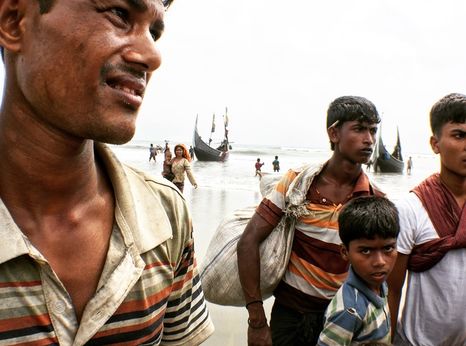More than 400 Rohingya people stranded at sea

Since August 2017, more than 740,000 Rohingya have fled their homes in Myanmar’s northern Rakhine State after the military unleashed a brutal campaign of violence against them. A UN report has concluded these crimes may also constitute genocide. In the years after the campaign, Rohingya have continued to flee across the border.
For years, the Rohingya have made attempts to reach Malaysia, Thailand, Indonesia and other countries. Lacking visas, travel documents and subject to strict restrictions on movement that make overland connections nearly impossible, boats are often the only option.
According to information obtained by Amnesty International, several hundred people are still believed to be at sea. In May 2020, dozens of lives were reportedly lost on a boat the Malaysian authorities turned away. The survivors, allowed to disembark in Bangladesh, were severely malnourished and dehydrated. In the most recent weeks in June, while initially accepting boats at sea, Malaysia and Bangladesh are now refusing to offer assistance to people in need of rescue. Moreover, coastguards have pushed back these vessels. Other countries have not responded.
South and Southeast Asian governments must immediately launch search and rescue operations for Rohingya stranded at sea, bringing food, medicine and allowing safe disembarkation. Authorities must not forcibly push boats back. The response to the COVID-19 pandemic should not be an excuse to block Rohingya from landing safely and seeking asylum.
Governments must also uphold commitments made under regional declarations, including the 2010 ASEAN Declaration on search and rescue operations at sea, the 2016 Bali Declaration, and the outcome of the February 2020 meeting of the Taskforce on the Bali Process, which “emphasized the primacy of saving lives at sea and not endangering the life and safety of persons in responding to irregular maritime migration.”
Despite being a non-State Party to the 1951 Convention, Indonesia plays a key role as being the co-chair of Bali Process with Australia. In 2016, Indonesia also issued a Presidential Regulation No. 125/2016 on the Handling of Foreign Refugees. In addition, Indonesia has a special Task Force on the Handling of Refugees (Satuan Tugas Penanganan Pengungsi dari Luar Negeri) under the Coordinating Ministry of Political, Legal and Security Affairs that is in coordination with the UN High Commissioner for Refugees (UNHCR) in Indonesia.
The international community must also do much more to support Bangladesh and share the responsibility and financial burden of hosting almost a million refugees at a time its economy is already under strain from the pandemic-related global slowdown. Finally, Rohingya refugees are entitled to continue to seek asylum and states must keep borders open to people who continue to flee now or will do so in the future.